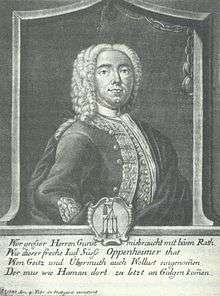Joseph Süß Oppenheimer
| Joseph Süß Oppenheimer | |
|---|---|
 | |
| Born |
1698/1699 Heidelberg, Electoral Palatinate |
| Died |
February 4, 1738 (aged 39) Stuttgart, Duchy of Württemberg |
| Occupation | Court Jew |
Joseph Süß Oppenheimer (1698 – February 4, 1738) was a German Jewish banker and court Jew for Duke Karl Alexander of Württemberg in Stuttgart. He was a nephew and stepson of the banker Samuel Oppenheimer, diplomat and Shtadlan to Kaiser Leopold of Austria.
Throughout his career, Oppenheimer made scores of powerful enemies, some of whom conspired to bring about his arrest and execution after Karl Alexander's death. In the centuries since his execution, Oppenheimer's rise and fall have been treated in two notable literary works, and his ordeal inspired two films, including the antisemitic production Jud Süß, released in Nazi Germany in 1940.[1]
Career
As a financial adviser to Duke Karl Alexander, he also gained a prominent position as a court Jew and held the reins of the finances in his duchy. It was alleged that he debased the currency, seized and sold off the property of manufacturers who were declared bankrupt, tripled the "wealth tax," levied a tax on foreigners visiting the duchy, sold monopolies on coffee, beer, and tobacco to foreign companies, introduced lotteries, sold government posts to the highest bidder, and corrupted the judicial system. As a result, he gained a number of enemies, especially in the duchy's "Catholic party."[2]
Arrest, trial and execution
When his protector, Karl Alexander, suddenly died on March 12, 1737, Oppenheimer was arrested and accused of various crimes, including fraud, embezzlement, treason, lecherous relations with the court ladies and accepting bribes. The Jewish community tried unsuccessfully to ransom him.[2]
After a heavily publicized trial, he was sentenced to death. When his jailers asked that he convert to Christianity, he refused.

Joseph Süß Oppenheimer was led to the gallows on February 4, 1738, and given a final chance to convert to Christianity, which he refused to do. He was hanged, with his last words reportedly being "Hear, O Israel: the Lord is our God, the Lord is one". His corpse was gibbeted in a human-sized bird cage that hung outside of Stuttgart in the Pragsattel district for six years until the inauguration of Karl Eugen, Duke of Württemberg, who permitted the hasty burial of his corpse below the gallows.
In literature, art and film
The story of Joseph Süß Oppenheimer was the subject of a number of literary and dramatic treatments over the course of more than a century; the earliest of these having been Wilhelm Hauff's 1827 novella titled Jud Süß.[3] The most successful literary adaptation was Lion Feuchtwanger's 1925 novel titled Jud Süß based on a play that he had written in 1916 though never performed and subsequently withdrawn by Feuchtwanger.
Ashley Dukes and Paul Kornfeld also wrote dramatic adaptations of the Feuchtwanger novel. In 1934, Lothar Mendes directed a film adaptation of the novel in which Süß was portrayed by actor Conrad Veidt.[4]:42–44 An anti-semitic Nazi propaganda film titled Jud Süß was made in 1940 by Veit Harlan, in which Süß was portrayed by actor Ferdinand Marian.
In the 1990s, the German sculptor Angela Laich created a sculpture devoted to Joseph Süß Oppenheimer as well as illustrations for German historian Hellmut G. Haasis's book Joseph Süß Oppenheimer genannt Jud Süß. Finanzier, Freidenker, Justizopfer.
Biographies
Shortly after Feuchtwanger's novel was published, Selma Stern published a biography of Oppenheimer titled Jud Süß: Ein Betrag zur deutschen und zur jüdischen Geschichte. More recently, Helmut Haasis published a biography titled "Joseph Süß Oppenheimer, genannt Jud Süß: Finanzier, Freidenker, Justizopfer"
References
- ↑ Tegel, Susan (2011). The Jew Süss : His Life and Afterlife in Legend, Literature and Film. London: Continuum. ISBN 9781847250179.
- 1 2 Adrien Fauchier-Magnan, Small German Courts in the Eighteenth Century, translated by Mervyn Savill (London: Methuen & Co., 1958), pp. 153-61
- ↑ Chase, Jefferson S. (1998). "The Wandering Court Jew and the Hand of God: Wilhelm Hauff's 'Jud Süss' as Historical Fiction". Modern Language Review. 93 (3): 724–740. JSTOR 3736493.
- ↑ B. Haines; S. Parker (17 March 2010). AESTHETICS AND POLITICS IN MODERN GERMAN CULTURE. Peter Lang. ISBN 978-3-03911-355-2. Retrieved 27 October 2011.